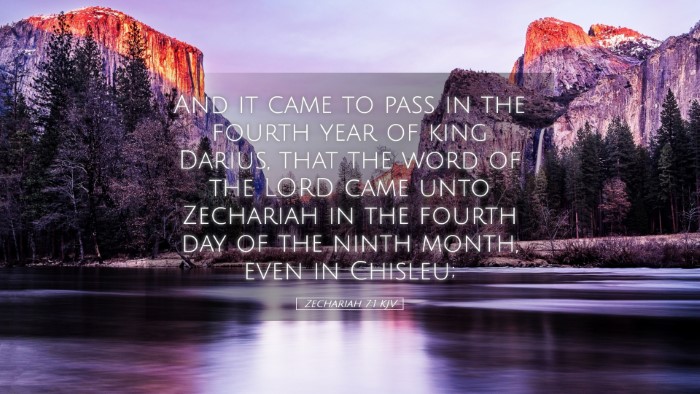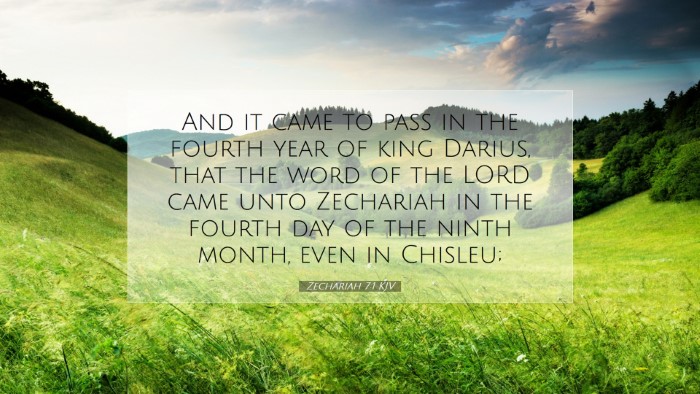Old Testament
Genesis Exodus Leviticus Numbers Deuteronomy Joshua Judges Ruth 1 Samuel 2 Samuel 1 Kings 2 Kings 1 Chronicles 2 Chronicles Ezra Nehemiah Esther Job Psalms Proverbs Ecclesiastes Song of Solomon Isaiah Jeremiah Lamentations Ezekiel Daniel Hosea Joel Amos Obadiah Jonah Micah Nahum Habakkuk Zephaniah Haggai Zechariah MalachiZechariah 7:1
Zechariah 7:1 KJV
And it came to pass in the fourth year of king Darius, that the word of the LORD came unto Zechariah in the fourth day of the ninth month, even in Chisleu;
Zechariah 7:1 Bible Commentary
Commentary on Zechariah 7:1
Verse: "And it came to pass in the fourth year of King Darius, that the word of the Lord came unto Zechariah in the fourth day of the ninth month, even in Chisleu."
Introduction
Zechariah 7:1 marks a significant transition in the prophetic narrative of Zechariah's writings. Taken within its historical context, this verse provides insight into the period of post-exilic Israel, as the community grapples with restoration and spiritual renewal. The opening of this chapter begins a new segment of Zechariah's prophetic ministry, highlighting the themes of divine justice, repentance, and the pursuit of true worship.
Historical Context
The reference to "the fourth year of King Darius" situates this prophecy chronologically between the return from exile and the rebuilding of the temple. Darius, the Persian king known for his administrative reforms, allowed the Jews to return to their homeland and reestablish their worship. The timing, in the month of Chisleu (around November-December), indicates a period of reflection as the community considers its spiritual state after years of captivity.
Commentary Insights
Matthew Henry's Perspective
Matthew Henry emphasizes the continuation of God’s message during a critical time for the Jewish people. He notes that despite having returned to the land, they faced challenges that questioned their spiritual prioritization and practices. Henry highlights the importance of God’s timely word to instruct and encourage His people amidst uncertainty.
Albert Barnes' Insights
Albert Barnes elaborates on the significance of the specific timeframe and its implications for the Jewish community. He underscores that this message was not only to encourage the restoration efforts but also to challenge the people to consider their current practices, where ritualism had begun to overshadow the heart of true worship. Barnes reflects on the importance of understanding divine motive behind such prophetic words and urges leaders to heed God’s counsel towards genuine repentance.
Adam Clarke's Commentary
Adam Clarke, in his remarks, draws attention to the cyclical nature of prophecy and its application to the human condition. He suggests that the recording of this prophecy serves as a reminder of God’s persistent engagement with His people, even when they falter. Clarke encourages readers to view the prophecy not as an isolated event, but as part of a larger divine narrative aimed at guiding humanity toward righteousness. He highlights the timeliness of God’s messages and their impact on the spiritual lives of the community.
Theological Themes
- Divine Communication: The phrase "the word of the Lord came unto Zechariah" encapsulates the essence of prophetic ministry, emphasizing God's desire to communicate His will and intentions to His people.
- Repentance and Renewal: The context of this prophecy echoes a call for spiritual introspection and renewal among the Jewish people, urging them to align their practices with God’s expectations.
- Historical Awareness: The specific mention of Darius and the time period serves as a reminder that God works within human history, using political circumstances to fulfill His divine promises.
Application for Today
For pastors, students, theologians, and Bible scholars, Zechariah 7:1 serves as an invitation for critical reflection on contemporary worship practices and the importance of aligning them with genuine faith and obedience to God’s commands. In light of Henry, Barnes, and Clarke's insights, there are several takeaways:
- Listening to God: The necessity of being attuned to God’s voice amid distractions of church life and ministry is paramount.
- Heart of Worship: Worship should be characterized by sincerity and rooted in a personal relationship with God, rather than mere observance of ritual.
- Contextual Understanding: Recognizing the historical context of Scripture can enrich one's understanding and application of biblical principles in modern scenarios.
Conclusion
Zechariah 7:1 serves as a profound reminder of God's ongoing relationship with His people and His relentless pursuit for their hearts. By analyzing the prophetic insights of Matthew Henry, Albert Barnes, and Adam Clarke, we gain a richer understanding of divine communication and its implications for both the ancient community and today’s believers. May we take these lessons to heart, striving for authenticity in our worship and attentiveness to God's leading in our lives.


